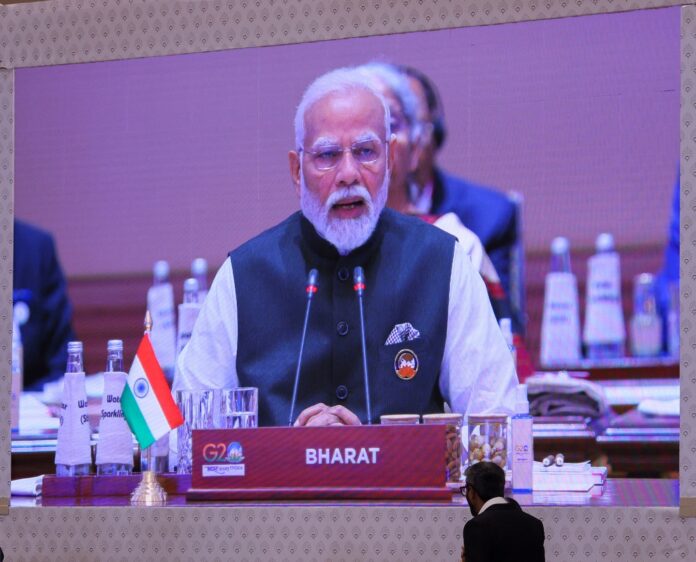At the summit, Modi sat behind a nameplate that identified the host country as Bharat. An earlier invitation to a banquet for visiting dignitaries was addressed from the “President of Bharat.” And a booklet distributed to the G-20 guests was entitled “Bharat: The Mother of Democracy.”
The question began swirling: Was Modi setting the stage for an official change of name for the world’s most populous country?
This would not be entirely surprising coming from Modi, whose political party is called the Bharatiya Janata Party (BJP) — Hindi for Indian People’s Party. Bharat and India have been the two officially recognized names of the country since independence from Great Britain, after a third proposed name, Hindustan, was jettisoned. Many Indians use the two names interchangeably when speaking in the several languages and dialects prevalent in the country, although “India” is the common name in English.
But any potential name change comes against the backdrop of rising Hindu nationalism at the expense of Muslims and other minorities, stoked by Modi and the BJP since coming to power in 2014.
Engendering nationalist and anti-Western sentiment has often been a reason behind changing the names of countries — particularly those that were named through colonization. It’s a handy device for leaders seeking to bolster their own legitimacy by appealing to anti-colonial sensibilities and instilling a sense of patriotism.
In Africa, for example, when a mid-ranking military officer named Joseph Mobutu seized power in a 1965 coup in the Democratic Republic of Congo, he launched a campaign for “authenticité,” to remove vestiges of the country’s Belgian colonial past. Citizens were ordered to change their European names to African ones — Mobutu himself became Mobutu Sese Seko Kuku Ngbendu wa za Banga, which means “the all-powerful warrior who, because of his endurance and inflexible will to win, goes from conquest to conquest, leaving fire in his wake.” He also changed the country’s name to the Republic of Zaire, derived from a Kongo language description of the mighty Congo River.
Mobutu, who proved to be a ruthless and corrupt dictator, was overthrown by a rebel army in 1997, and the country’s name was quickly restored to the Democratic Republic of Congo. To the victor goes the naming rights.
Likewise the military generals ruling Burma changed the country’s name to Myanmar in 1989, as a way to try to legitimize their power grab a year after killing thousands of protesters in an anti-government uprising. For decades, the country had been known as Burma after the dominant ethnic group. The junta leaders said a name change was needed to break from the colonial past and be more inclusive to non-Burman ethnic minorities.
The United Nations now officially recognizes the country as Myanmar. The United States still uses the name Burma, because it does not recognize the legitimacy of the government that changed the name.
Swaziland’s King Mswati III unilaterally changed his country’s name to Eswatini in 2018, to mark its 50th anniversary of independence from Britain. The name Eswatini means “land of the Swazi people” in the Swazi language.
Other countries have changed their names for more mundane or pragmatic reasons that have nothing to do with throwing off a colonialist yoke.
The Republic of Macedonia became the Republic of North Macedonia in 2018 to end a decades-long dispute with Greece, which has a region with the same name — and was blocking the country’s NATO membership until the name switch.
The Czech Republic had an even more practical reason for a name change. The name, inherited at the breakup of Czechoslovakia, was a mouthful, and no one knew what English shorthand to use for citizens. So it became Czechia.
But why would Modi be considering changing India to Bharat? And why now?
With the BRICS grouping of Brazil, Russia, India, China and South Africa set to expand and add, among other nations, Argentina and Egypt, perhaps Modi was hoping that switching to Bharat might reserve a place for India near the head of the alphabetical pecking order.
Besides appealing to his Hindu nationalist base, the prime minister also appears driven by a combination of pique and blatant political expediency before elections due by next May. More than two dozen opposition parties announced in July that they were joining forces to try to oust Modi’s BJP at the polls. The new alliance calls itself the Indian National Developmental Inclusive Alliance. It’s not-coincidentally-convenient acronym: INDIA.
Playing up the acronym, the opposition cast the coming elections as a test of “Modi versus INDIA.” Modi responded by comparing the alliance to the 19th-century East India Tea Company, which was responsible for colonizing the country.
There’s no telling where this global name-swapping might turn up next. Might the ayatollahs of Iran be tempted to restore the ancient name Persia, since it was the British-installed Reza Shah Pahlavi who changed it to Iran? Perhaps China’s President Xi Jinping, an authoritarian who also likes to stoke nationalist sentiment, will insist on changing his country’s name in English to “Zhongguo,” which is how the country is referred to in Mandarin.
Even if the name is formally changed, I suspect many around the world will always refer to Bharat as India, much like South Vietnamese (and some American boomers) still refer to Ho Chi Minh City as “Saigon.” Or in the way many Brits, including Hong Kong’s last colonial governor, Chris Patten, still call the Chinese capital “Peking.” I, for one, still cannot use “Ronald Reagan” for our capital’s favored airport — it will always be Washington National to me.



